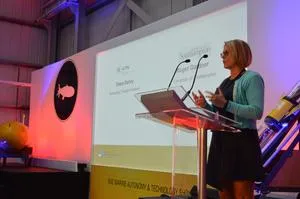
‘A Year of Autonomy’ was launched today at the National Oceanography Centre (NOC). This programme of five workshops aims to address the common challenges faced by robotic systems on land, sea and air by encouraging shared learning and collaboration.
These challenges include; the development of artificial intelligence, societal acceptance and energy management.
This initiative is part of the South Coast Marine Cluster and aims to help the autonomous systems industries in this region to grow and position the South Coast as a hub for innovative, high value companies.
Speaking at the launch during the Marine Autonomy and Technology showcase, hosted by the NOC, Kevin Forshaw, NOC’s Associate Director, Innovation and Enterprise said “Along with our partners in this initiative, the NOC is in a strong position to facilitate addressing the common challenges faced by the robotics industry. By talking across sectors, we hope that A Year of Autonomy will have a higher impact than we can have by working in our traditional networks.”
The workshops will facilitate cross-sector learning, network building, identification of areas needing investment and collaboration in order to meet the challenges facing the whole industry. They will be hosted by a series of organisations that have an interest in robotics and are based along the South Coast, including NOC, Plymouth Marine Laboratory, QinetiQ and the Universities of Exeter, Southampton and Portsmouth.
The launch of this programme coincides with the first anniversary of the opening of the Marine Robotics Innovation Centre in Southampton. Opened in November last year, by Jo Johnson, Minister of State for Universities and Science, the centre now has 19 partners and eight companies located in the building working in partnership with the NOC’s engineers and scientists. The centre also has 11 Associate Members who regularly access the programme of networking events. The centre has created six full time positions so far, and has pulled in £15 million of investment for autonomy and sensor development and £8m worth of collaborative research and development projects.